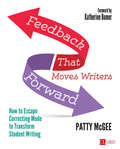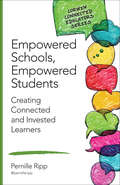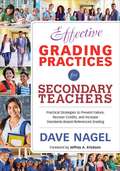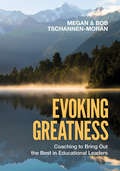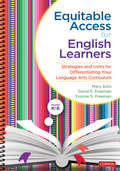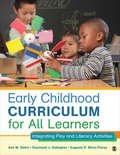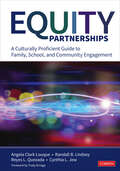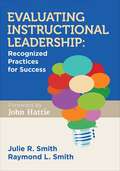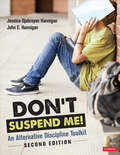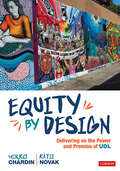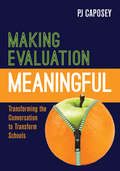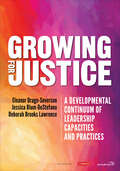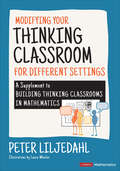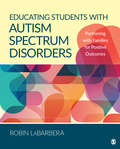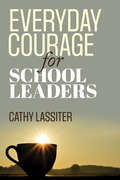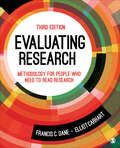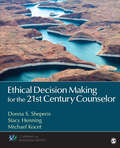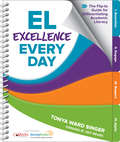- Table View
- List View
Feedback That Moves Writers Forward: How to Escape Correcting Mode to Transform Student Writing (Corwin Literacy)
by Patty McGee"Patty McGee should be called the ′Writer Whisperer.′ She offers brilliant advice for helping struggling writers, accomplished writers, and all those in between." —Debbie Silver, Co-author of Teaching Kids to Thrive The number one challenge of student writers today isn’t word choice, logic, voice, or even grammar and spelling—it’s buy-in. In Feedback That Moves Writers Forward, Patty McGee shares how to’s for teaching that changes the writing-as-obligation vibe for good. She demonstrates the way feedback can inspire students to reach new heights as writers. With Patty’s help, you learn to: Resign from your position as Corrector-in-Chief and be amazed as students eagerly take over responsibility for refining their writing Apply the research on growth mindset and goal setting, whether you use a writing program or a workshop model Use tone, trust, and language to quicken students’ discovery of their writing identities and take risks when they are stuck Use student work to deliver clear, just-in-time feedback during planning, drafting, revising, and editing Use the online printable forms for delivering customized feedback with just the right wording Balance grading and feedback Help writers reflect so they are better able to apply what they learned about content, craft, and style to their future writing One of the bravest things we can do as teachers is to admit when a long held practice isn’t working. Error-focused feedback is one such practice. So put down the red pen, pick up this book, and learn to say the right thing at the right time to develop fearless, original, and intentional writers—in any content area.
Empowered Schools, Empowered Students: Creating Connected and Invested Learners (Corwin Connected Educators Series)
by Pernille S. RippOpen up a new world of learning and engage students with these powerful ideas! This book helps you empower teachers and students to regain control of their own teaching and learning journey. With this helpful guide, cultivate enthusiasm for learning by changing the power dynamic and putting the reins back into the hands of students. Administrators and teachers learn to: Cultivate the experts at your school Create an environment of trust and collaboration Give students and staff a voice Includes real-life stories from other connected educators! Transform the learning experience and create lasting change with this breakthrough volume of the Connected Educators Series! The Corwin Connected Educators series is your key to unlocking the greatest resource available to all educators: other educators. Being a Connected Educator is more than a set of actions: it’s a belief in the potential of technology to fuel lifelong learning. "Pernille has shared what it takes to create an environment that nurtures growth for students and staff." —Nicholas Provenzano, The Nerdy Teacher TheNerdyTeacher.com @TheNerdyTeacher "Pernille makes a case for the need to change from a traditional hierarchical approach of control to a shared, empowering approach. This book outlines steps that administrators can take to share leadership in their schools and teachers can take to share the responsibility of learning with the students." —William Chamberlain, Teacher Noel Elementary School
Effective Grading Practices for Secondary Teachers: Practical Strategies to Prevent Failure, Recover Credits, and Increase Standards-Based/Referenced Grading
by Dave NagelEnact innovative grading systems that more accurately describe student progress! This book challenges traditional grading practices and provides alternatives that can have direct impact on student success. By making subtle shifts toward standards based grading systems, schools can reduce unnecessary course failures, provide students and their families a more accurate picture of current progress, and increase opportunities for success. The author offers a range of grading reform strategies that are built from practical frameworks that are effective and simple to adapt. Among the many strengths of this book are: Practical application of existing research and evidence base for effective secondary grading reforms A framework for schools and districts to apply and adapt failure prevention strategies such as early failure detection, Amnesty Days, and meaningful stipulated second chance opportunities for students to reach mastery Functional strategies and actions for shifting toward standards-based (referenced) grading without entirely abandoning letter grades Countering resistance to change through a-clearly-articulated plan for conducting school-wide and classroom level action research around the effectiveness of new or adjusted grading practices "Informative and pragmatic, this book is spot on with analysis of this elephant in the room issue. Nagel uses both empathy and humor in getting to the heart of a process to generate real solutions while underscoring the ultimate need for teacher voice in any successful implementation. He provides ready-made strategies for real, impactful change. I′m left hopeful that feedback will rule the day!" —Bruce Potter, Superintendent Berkshire UFSD "Nagel offers an insightful and articulate voice to secondary improvement and alignment through grading practices. His tried and true methods through working with real districts provides a starting place and examples for others to follow. A must-read for anyone serious about ensuring student engagement through meaningful feedback." —Debra K. Howe, Superintendent Tri-Creek School Corporation ?
Evoking Greatness: Coaching to Bring Out the Best in Educational Leaders
by Megan Tschannen-Moran Robert K. Tschannen-MoranDiscover coaching strategies to inspire greatness in any educational leader! Centered on evocative coaching, a person-centered, no-fault, strengths-based coaching model, this book will equip those who coach educational leaders to host engaging and productive coaching conversations. Coaches who read this book will learn to LEAD: Listen, Empathize, Appreciate, and Design, as well as to discover: Guidance for coaching leaders with specific questions, things to listen for, and ways to generate new ideas and motivation Research-based theories that ground the strategies presented in each chapter Real-life vignettes that illustrate the evocative coaching model in action Reflection and discussion questions, templates, and other materials to scaffold the learning of coaches as they innovate their way forward "Leadership coaching has arisen as a powerful intervention to support the professional learning of leaders. In this book Megan and Bob Tschannen-Moran invite us to see into their world of evocative coaching. They demonstrate how coaching conversations can lead to a flow of energy, enthusiasm and possibilities that bring out movement in people. The authors combine their theoretical knowledge with their experience as coaches, exemplified in wonderful stories and practical examples. As a coach myself I could not stop reading because I was so curious about the next chapter. The book is a great example of how high quality professional learning can enhance educational leaders′ daily leadership practice." —Marit Aas, Associate Professor University of Oslo, Oslo, Norway
Equitable Access for English Learners, Grades K-6: Strategies and Units for Differentiating Your Language Arts Curriculum
by Yvonne S. Freeman David E. Freeman Mary SotoPlain and simple: until our English learners have equitable access to the curriculum, they’ll continue to struggle with subject area content. And if you’re relying on add-on’s to fit in from your language arts basal or a supplementary program, Mary Soto, David Freeman, and Yvonne Freeman are here to equip you with much more effective, efficient, and engaging strategies for helping your English learners read and write at grade level. One assurance right from the start: Mary, David, and Yvonne are not suggesting you reinvent your curriculum. Instead, Equitable Access for English Learners, Grades K-6, focuses on how to fortify foundational practices already in place. First, you’ll learn more about the Equitable Access Approach, then it’s time to dive into the book’s four units of study. Drawing on each unit’s many strategies, you’ll discover how to apply them to any unit in your own language arts curriculum and start differentiating: How to draft and implement language objectives to help English learners meet academic content standards How to make instructional input comprehensible, including translanguaging strategies that draw on your students’ first languages when you don’t know how to speak them How to utilize the characteristics of text to support readers, along with a rubric for determining a text’s cultural relevance How to build students’ academic content knowledge and develop academic language proficiency Each unit addresses a commonly taught topic in today’s language arts programs and comes with ready-to-go review and preview activities, key strategies, grade-level adaptations, reflection exercises, and printable online resources. Taken as a whole, they constitute an all-new approach for providing that equitable and excellent access our English learners so rightfully deserve. "When you adopt our Equitable Access Approach, your students will not only thrive, they’ll also find your language arts curriculum much more meaningful and engaging." —Mary Soto, David E. Freeman, and Yvonne S. Freeman
Early Childhood Curriculum for All Learners: Integrating Play and Literacy Activities
by Ann M. Selmi Raymond J. Gallagher Eugenia R. Mora-FloresEarly Childhood Curriculum for All Learners: Integrating Play and Literacy Activities is designed to teach early childhood professionals about the latest research on play and early literacy and then to show them practical methods for adapting this research to everyday classroom practices that will encourage the development of learning skills. The authors link solid, play-based research to specific developmentally appropriate practices. By combining these two areas, the text demonstrates that academic learning and play activities are highly compatible, and that children can and do develop academic skills through play. In addition, the text focuses on socio-dramatic play, a recently acknowledged, essential aspect of child-initiated play interactions. It provides specific strategies that link these interactive behaviors with the early academic skills needed for the initial primary grades. Implementation of the information presented in this book will enable children to experience a richer transition into primary education classrooms.
Equity Partnerships: A Culturally Proficient Guide to Family, School, and Community Engagement
by Randall B. Lindsey Reyes L. Quezada Cynthia L. Jew Angela R. Clark-LouqueHow often do you hear, "The only parents who showed were the parents who didn’t need to be here." But how often do you consider time of day, lack of child care, cost of dinner, transportation, language of the presentation, even relevance of the topic—all real-world barriers for families of our historically underserved students. Here at last is a resource that will open up access and reveal all-new ways to forge more culturally inclusive partnerships with families and communities . . . partnerships that extend well beyond parent-teacher conferences, PTA meetings, and the occasional bake sale. The two big services Equity Partnerships provides? Using the Tools of Cultural Proficiency, you’ll Discover new concepts and strategies to engage families and communities—and reduce, if not eliminate, barriers--through four essential principles: communication, connection, collaboration, and community Engage in frequent opportunities to reflect on your own assumptions and values, then collaborate with colleagues to co-create systemic practices and policies for devising, implementing, and assessing family and community engagement actions in your schools and districts We know inherently that family and community engagement is critical to the success of our students. Let Equity Partnerships be your go-to tool for breaking down the walls that for too long have limited all of us. "Raising the next generation is a shared responsibility and privilege. These authors have been first responders for decades by promoting Cultural Proficiency as a means to ensure equity and access for all. In Equity Partnerships, they identify the powerful and critical link of family, school, and community engagement to strengthen families, build community support, and increase student success." --TRUDY ARRIAGA, Associate Dean for Equity and Outreach, California Lutheran University, and Coauthor of Opening Doors
Evaluating Instructional Leadership: Recognized Practices for Success
by Raymond L. Smith Julie Rae SmithImprove principal evaluation and create highly effective leaders! Even with great teachers, student achievement hinges on an effective principal. Behind every high-quality principal is an airtight system of leadership evaluation that consistently rewards excellence and remedies deficits. While teacher evaluation methods have improved, instructional leadership evaluation has often stood still—and student learning and achievement have paid the price. This book identifies the major problems in this process and articulates clear solutions. The result is a blueprint for ensuring the best person for the job is occupying the principal’s chair. Content includes: Extensive data, presented in a user-friendly manner Clear connections to the ISLLC Standards for School Leaders A suite of interactive tools including sample self-assessments, mid-year and final evaluation forms, and professional growth plans "This book not only highlights the key messages about the role of the leader, but it is does so in a way that is engaging, practical, and reflects the Smiths’ long history of being school leaders, teaching school leaders, and seeing the effects of their teaching. I have seen the Smiths in action, separately and together, and they know how to lead and how to teach, they have a strength of purpose they do not waver from, and these attributes come through in this book." -John Hattie, Director Melbourne Education Research Institute, University of Melbourne "After reading this book, you′ll truly understand what it takes to grow as a lead learner. We can always get better. This book provides quality insight on strategies that will make good leaders great." -Brad Currie, School Leader, Corwin Author and Co-Founder of #Satchat
Don′t Suspend Me!: An Alternative Discipline Toolkit
by John E. Hannigan Jessica Djabrayan HanniganShift from traditional to alternative discipline that really works As educators face ever-changing discipline laws and regulations coupled with a return to in-person learning, the second edition of Don’t Suspend Me! arrives at the perfect time to guide them in everything they need to know to avoid reverting to traditional, exclusionary discipline practices. This user-friendly guidebook helps teachers and administrators use alternative discipline methods to create positive, meaningful, and long-term behavior shifts for students. Inside you’ll find An updated alternative discipline toolkit with additional easy-to-use tools, templates, and processes Methods for addressing traditional beliefs and pushback from stakeholders Recommendations for bringing policy to practice Case studies, examples, and lessons learned from educators in the field who successfully used the first edition Examples of the 13 most suspendable offenses and the appropriate responses and interventions to help change student behavior for the long term Organized to help educators implement alternative discipline, this updated edition frames discipline in a practical and effective way that aligns with research, changes in educational law, and—above all else—equity in school discipline.
Effective Grading Practices for Secondary Teachers: Practical Strategies to Prevent Failure, Recover Credits, and Increase Standards-Based/Referenced Grading
by Dave NagelEnact innovative grading systems that more accurately describe student progress! This book challenges traditional grading practices and provides alternatives that can have direct impact on student success. By making subtle shifts toward standards based grading systems, schools can reduce unnecessary course failures, provide students and their families a more accurate picture of current progress, and increase opportunities for success. The author offers a range of grading reform strategies that are built from practical frameworks that are effective and simple to adapt. Among the many strengths of this book are: Practical application of existing research and evidence base for effective secondary grading reforms A framework for schools and districts to apply and adapt failure prevention strategies such as early failure detection, Amnesty Days, and meaningful stipulated second chance opportunities for students to reach mastery Functional strategies and actions for shifting toward standards-based (referenced) grading without entirely abandoning letter grades Countering resistance to change through a-clearly-articulated plan for conducting school-wide and classroom level action research around the effectiveness of new or adjusted grading practices "Informative and pragmatic, this book is spot on with analysis of this elephant in the room issue. Nagel uses both empathy and humor in getting to the heart of a process to generate real solutions while underscoring the ultimate need for teacher voice in any successful implementation. He provides ready-made strategies for real, impactful change. I′m left hopeful that feedback will rule the day!" —Bruce Potter, Superintendent Berkshire UFSD "Nagel offers an insightful and articulate voice to secondary improvement and alignment through grading practices. His tried and true methods through working with real districts provides a starting place and examples for others to follow. A must-read for anyone serious about ensuring student engagement through meaningful feedback." —Debra K. Howe, Superintendent Tri-Creek School Corporation ?
Equity by Design: Delivering on the Power and Promise of UDL
by Mirko Chardin Katie R. Novak"Our calling is to drop our egos, commit to removing barriers, and treat our learners with the unequivocal respect and dignity they deserve." --Mirko Chardin and Katie Novak When it comes to the hard work of reconstructing our schools into places where every student has the opportunity to succeed, Mirko Chardin and Katie Novak are absolutely convinced that teachers should serve as our primary architects. And by "teachers" they mean legions of teachers working in close collaboration. After all, it’s teachers who design students’ learning experiences, who build student relationships . . . who ultimately have the power to change the trajectory of our students’ lives. Equity by Design is intended to serve as a blueprint for teachers to alter the all-too-predictable outcomes for our historically under-served students. A first of its kind resource, the book makes the critical link between social justice and Universal Design for Learning (UDL) so that we can equip students (and teachers, too) with the will, skill, and collective capacity to enact positive change. Inside you’ll find: Concrete strategies for designing and delivering a culturally responsive, sustainable, and equitable framework for all students Rich examples, case studies, and implementation spotlights of educators, students (including Parkland survivors), and programs that have embraced a social justice imperative Evidence-based application of best practices for UDL to create more inclusive and equitable classrooms A flexible format to facilitate use with individual teachers, teacher teams, and as the basis for whole-school implementation "Every student," Mirko and Katie insist, "deserves the opportunity to be successful regardless of their zip code, the color of their skin, the language they speak, their sexual and/or gender identity, and whether or not they have a disability." Consider Equity by Design a critical first step forward in providing that all-important opportunity. Also From Corwin: Hammond/Culturally Responsive Teaching & the Brain: 9781483308012 Moore/The Guide for White Women Who Teach Black Boys: 9781506351681 France/Reclaiming Professional Learning: 9781544360669
Evaluating Professional Development
by Thomas R. GuskeyHow do we determine the effects and effectiveness of activities designed to enhance the professional knowledge and skills of educators so that they might improve the learning of students? Thomas R. Guskey explores the processes and procedures involved in evaluating professional development, from the very simple to the very complex, at five increasing levels of sophistication: Participants′ reactions to professional development How much participants learn Evaluating organizational support and change How participants use their new knowledge and skills Improvement in student learning . . . complete with sample evaluation forms, checklists, and helpful hints and tips.
Making Evaluation Meaningful: Transforming the Conversation to Transform Schools
by P J CaposeyRe-evaluate your perspective on teacher evaluation to truly transform school performance! The tools, strategies, and reflections in this book provide realistic solutions to the problem faced by many schools: meaningless evaluation. A considerable amount of time, energy, and money is spent on the teacher evaluation process, yet the question remains whether it is truly transforming the learning of teachers and, therefore, students. This practical guide shows how evaluation can become the tie that binds all school improvement activities together to: Bring clarity and purpose to all educators making their roles more effective Improve teacher practice since they receive better support Increase student achievement and overall school culture "For years, building leaders have been agonizing over teacher evaluations, pouring countless hours into a practice that consistently fails to produce the desired result; more meaningful conversations that produce improved quality instructional practices and increases in student achievement. In his book, Making Evaluation Meaningful, PJ Caposey shares a step by step framework filled with quick & easy to follow "Tips for Tomorrow," as well as detailed examples to help you shift your mindset and behave yourself to a more effective instructional leader. This book will leave you questioning your own evaluation system while at the same time inspiring you to re-commit the time and resources needed to help grow and develop your teachers." —Jimmy Casas, Principal and CEO " PJ Caposey, through a practitioner lens, has developed an incredible guide that not only helps to demystify the evaluation process, but also provide ready-to- use strategies to ensure reflection and growth are the result. In the end evaluation must be meaningful for both parties. This book will help get you there." —Eric Sheninger, Author/Consultant, Senior Fellow/Thought Leader "PJ Caposey has developed a great resource on teacher evaluation that actually provides realistic, encouraging, and supportive guidance instead of an arbitrary checklist!" —Larry Ferlazzo, Teacher, Author and Education Week Teacher advice blogger Luther Burbank High School, Sacramento, CA
Growing for Justice: A Developmental Continuum of Leadership Capacities and Practices
by Eleanor Drago-Severson Jessica Blum-DeStefano Deborah Brooks LawrenceBe the leader you want to see in the world. Educators committed to social justice enter into the work in markedly different ways. Drawing from research with 50 educational leaders from across the United States, Growing for Justice explores how leaders committed to social justice support the growth of others while also developing their own capacities to engage, connect, and lead for change. This groundbreaking book, informed by adult developmental theory and based on a first-of-its-kind study, helps school leaders assess their own strengths and areas for growth—and then take concrete steps toward improvement. Features include: Exploration of meaning-making systems and how they affect leaders’ understandings of diversity, equity, and social justice A research-based, developmental model of justice-centering educational leadership capacities and practices Leaders’ personal stories of growth and development as advocates Planning activities and reflective exercises to drive decision-making, action, and internal capacity-building Wherever you are in your social justice journey, wanting to do better is the first step toward actually doing better. With this book’s help, you’ll outline the supports, stretches, and scaffoldings you need to continually grow for justice.
Modifying Your Thinking Classroom for Different Settings: A Supplement to Building Thinking Classrooms in Mathematics (Corwin Mathematics Series)
by Peter LiljedahlKeep thinking…keep learning in different settings In Peter Liljedahl’s bestselling Building Thinking Classrooms in Mathematics: 14 Teaching Practices for Enhancing Learning, readers discovered that thinking is a precursor to learning. Translating 15 years of research, the anchor book introduced 14 practices that have the most potential to increase student thinking in the classroom and can work for any teacher in any setting. But how do these practices work in a classroom with social distancing or in settings that are not always face-to-face? This follow-up supplement will answer those questions, and more. It walks teachers through how to adapt the 14 practices for 12 distinct settings, some of which came about as a result of the COVID-19 pandemic. This guide: Provides the what, why, and how to adapt each practice in face-to-face settings that require social distancing, fixed seating, or small class sizes; synchronous and asynchronous virtual settings; synchronous and asynchronous hybrid settings; independent learning; and homeschooling. Includes guidance on using thinking classroom practices to support students in unfinished learning in small groups and one-on-one teaching or tutoring. Offers updated toolkits and a recommended order for the implementation of the practices for each of the settings. This supplement allows teachers to dip in as needed and continually modify the practices as their own classroom situations change and evolve, always keeping the thinking at the forefront of their mathematics teaching and learning.
Empowered Schools, Empowered Students: Creating Connected and Invested Learners (Corwin Connected Educators Series)
by Pernille S. RippOpen up a new world of learning and engage students with these powerful ideas! This book helps you empower teachers and students to regain control of their own teaching and learning journey. With this helpful guide, cultivate enthusiasm for learning by changing the power dynamic and putting the reins back into the hands of students. Administrators and teachers learn to: Cultivate the experts at your school Create an environment of trust and collaboration Give students and staff a voice Includes real-life stories from other connected educators! Transform the learning experience and create lasting change with this breakthrough volume of the Connected Educators Series! The Corwin Connected Educators series is your key to unlocking the greatest resource available to all educators: other educators. Being a Connected Educator is more than a set of actions: it’s a belief in the potential of technology to fuel lifelong learning. "Pernille has shared what it takes to create an environment that nurtures growth for students and staff." —Nicholas Provenzano, The Nerdy Teacher TheNerdyTeacher.com @TheNerdyTeacher "Pernille makes a case for the need to change from a traditional hierarchical approach of control to a shared, empowering approach. This book outlines steps that administrators can take to share leadership in their schools and teachers can take to share the responsibility of learning with the students." —William Chamberlain, Teacher Noel Elementary School
Don′t Suspend Me!: An Alternative Discipline Toolkit
by John E. Hannigan Jessica Djabrayan HanniganShift from traditional to alternative discipline that really works As educators face ever-changing discipline laws and regulations coupled with a return to in-person learning, the second edition of Don’t Suspend Me! arrives at the perfect time to guide them in everything they need to know to avoid reverting to traditional, exclusionary discipline practices. This user-friendly guidebook helps teachers and administrators use alternative discipline methods to create positive, meaningful, and long-term behavior shifts for students. Inside you’ll find An updated alternative discipline toolkit with additional easy-to-use tools, templates, and processes Methods for addressing traditional beliefs and pushback from stakeholders Recommendations for bringing policy to practice Case studies, examples, and lessons learned from educators in the field who successfully used the first edition Examples of the 13 most suspendable offenses and the appropriate responses and interventions to help change student behavior for the long term Organized to help educators implement alternative discipline, this updated edition frames discipline in a practical and effective way that aligns with research, changes in educational law, and—above all else—equity in school discipline.
Equitable Access for English Learners, Grades K-6: Strategies and Units for Differentiating Your Language Arts Curriculum
by Yvonne S. Freeman David E. Freeman Mary SotoPlain and simple: until our English learners have equitable access to the curriculum, they’ll continue to struggle with subject area content. And if you’re relying on add-on’s to fit in from your language arts basal or a supplementary program, Mary Soto, David Freeman, and Yvonne Freeman are here to equip you with much more effective, efficient, and engaging strategies for helping your English learners read and write at grade level. One assurance right from the start: Mary, David, and Yvonne are not suggesting you reinvent your curriculum. Instead, Equitable Access for English Learners, Grades K-6, focuses on how to fortify foundational practices already in place. First, you’ll learn more about the Equitable Access Approach, then it’s time to dive into the book’s four units of study. Drawing on each unit’s many strategies, you’ll discover how to apply them to any unit in your own language arts curriculum and start differentiating: How to draft and implement language objectives to help English learners meet academic content standards How to make instructional input comprehensible, including translanguaging strategies that draw on your students’ first languages when you don’t know how to speak them How to utilize the characteristics of text to support readers, along with a rubric for determining a text’s cultural relevance How to build students’ academic content knowledge and develop academic language proficiency Each unit addresses a commonly taught topic in today’s language arts programs and comes with ready-to-go review and preview activities, key strategies, grade-level adaptations, reflection exercises, and printable online resources. Taken as a whole, they constitute an all-new approach for providing that equitable and excellent access our English learners so rightfully deserve. "When you adopt our Equitable Access Approach, your students will not only thrive, they’ll also find your language arts curriculum much more meaningful and engaging." —Mary Soto, David E. Freeman, and Yvonne S. Freeman
Educating Students with Autism Spectrum Disorders: Partnering with Families for Positive Outcomes
by Robin L. LaBarberaEducating Students with Autism Spectrum Disorders: Partnering with Families for Positive Outcomes focuses on practical strategies for educating children with autism spectrum disorders in the classroom. Additional features describe how to partner with families in the implementation of many of the strategies, giving voice to parents, based on recent quantitative and qualitative research. Case studies developed from real interviews with parents and educators open each chapter, and the book focuses on what "works" and what "does not work" in their collaborative experiences.
Everyday Courage for School Leaders
by Cathy J. LassiterDevelop and enhance Leadership Courage to lead every day with equity and excellence! Have you ever wondered how or where you find the inner strength and determination to stand up and lead fellow administrators, teachers, or students to meet ever-changing expectations? Courage is a "must have" for effective leadership. Everyday Courage guides readers to develop Leadership Courage from within and become exceptional and resilient. In addition to expanding instructional leadership, practical elements and features include: • How to Take Action: make specific plans to activate moral courage, intellectual courage, empathetic courage, and disciplined courage • Daily Practices: exercises in accountability, trust, and risk-taking maintain courageous leadership for equity, excellence, and inclusion • Courage Quotient: assess and consider your areas of strength and opportunities for growth through deliberate practice Whether you are new to leadership or seeking revitalization, Cathy Lassiter’s experience in all levels of educational management will focus you toward leading from a courageous mindset. "Leadership is about fostering growth, building capacity, and collaboratively working with stakeholders to create new ideas - this takes a great deal of courage. Cathy Lassiter creates a pathway for leaders to develop that courage, and shows them how to do it with empathy. Everyday Courage for School Leaders is an outstanding read for anyone new to leadership and those who need to revitalize their thinking." - Peter DeWitt, Author/Consultant "A great resource to support leaders as they revise, reflect, and reassure staff, students, and community of the possibilities through their leadership as we embrace the courage to accomplish goals to achieve success." - Brenda Yoho, Director of Educational Support Programs
Evaluating Research: Methodology for People Who Need to Read Research
by Francis C. Dane Elliot Donald CarhartThe third edition of Evaluating Research by Francis C. Dane and Elliot Carhart provides students with the skills to read and evaluate research studies. Aimed at courses where it is more important for students to develop an understanding of methods, rather than conduct their own research, this book covers all aspects of reading social, behavioral, and health science research from the basics, such as the structure of reports and accessing research, as well as overviews of the main types of research methods. The authors emphasize critical reading skills to enable students to become experts in evaluating research, so students can decide whether to incorporate that research into their future professional activities. Each chapter includes an overview at the beginning and exercises at the end to reinforce the content learned. Starting from the basic principles of why we do research, the book moves readers through the practicalities of finding studies to the principles of the scientific method and how to break down and analyze research reports. New to the third edition, Understanding Checks placed throughout each chapter help students cement their learning. The organization of the book is now more logical, with a new chapter on accessing research up front and ending with a chapter on statistical analyses. New research examples throughout, including such topical examples as mindfulness, college attendance, and bias in healthcare, help students see the relevance of research in their lives.
Everyday Courage for School Leaders
by Cathy J. LassiterDevelop and enhance Leadership Courage to lead every day with equity and excellence! Have you ever wondered how or where you find the inner strength and determination to stand up and lead fellow administrators, teachers, or students to meet ever-changing expectations? Courage is a "must have" for effective leadership. Everyday Courage guides readers to develop Leadership Courage from within and become exceptional and resilient. In addition to expanding instructional leadership, practical elements and features include: • How to Take Action: make specific plans to activate moral courage, intellectual courage, empathetic courage, and disciplined courage • Daily Practices: exercises in accountability, trust, and risk-taking maintain courageous leadership for equity, excellence, and inclusion • Courage Quotient: assess and consider your areas of strength and opportunities for growth through deliberate practice Whether you are new to leadership or seeking revitalization, Cathy Lassiter’s experience in all levels of educational management will focus you toward leading from a courageous mindset. "Leadership is about fostering growth, building capacity, and collaboratively working with stakeholders to create new ideas - this takes a great deal of courage. Cathy Lassiter creates a pathway for leaders to develop that courage, and shows them how to do it with empathy. Everyday Courage for School Leaders is an outstanding read for anyone new to leadership and those who need to revitalize their thinking." - Peter DeWitt, Author/Consultant "A great resource to support leaders as they revise, reflect, and reassure staff, students, and community of the possibilities through their leadership as we embrace the courage to accomplish goals to achieve success." - Brenda Yoho, Director of Educational Support Programs
Evaluating Research: Methodology for People Who Need to Read Research
by Francis C. Dane Elliot Donald CarhartThe third edition of Evaluating Research by Francis C. Dane and Elliot Carhart provides students with the skills to read and evaluate research studies. Aimed at courses where it is more important for students to develop an understanding of methods, rather than conduct their own research, this book covers all aspects of reading social, behavioral, and health science research from the basics, such as the structure of reports and accessing research, as well as overviews of the main types of research methods. The authors emphasize critical reading skills to enable students to become experts in evaluating research, so students can decide whether to incorporate that research into their future professional activities. Each chapter includes an overview at the beginning and exercises at the end to reinforce the content learned. Starting from the basic principles of why we do research, the book moves readers through the practicalities of finding studies to the principles of the scientific method and how to break down and analyze research reports. New to the third edition, Understanding Checks placed throughout each chapter help students cement their learning. The organization of the book is now more logical, with a new chapter on accessing research up front and ending with a chapter on statistical analyses. New research examples throughout, including such topical examples as mindfulness, college attendance, and bias in healthcare, help students see the relevance of research in their lives.
Ethical Decision Making for the 21st Century Counselor (Counseling and Professional Identity)
by Stacy L. Henning Michael M. Kocet Donna S. SheperisEthical practice is an essential aspect of counselor training. In order for counselors to competently work with clients, they must be well versed in ethical codes, ethical decision making, and legal issues impacting the profession. Ethical Decision Making for the 21st Century Counselor provides the fundamentals of ethical practice, with emphasis on ethical decision making and is structured to facilitate the development of these skills and understanding and applying them. Individuals will be able to incorporate ethical practice into their understanding of the counseling process and integrate ethical decision making models into their counseling practice. This unique approach differs from existing texts because of its strong emphasis on practical decision making and focus on understanding the process of applying a standard ethical decision model to any ethical scenario. Students build a foundation in how to evaluate an ethical situation and feel confident that they have applied a set of decision models to reach the best decision. Ethical Decision Making for the 21st Century Counselor is part of the SAGE Counseling and Professional Identity Series, which targets specific competencies identified by CACREP (Council for Accreditation of Counseling and Related Programs).
EL Excellence Every Day: The Flip-to Guide for Differentiating Academic Literacy
by Tonya W. SingerTake the Flip-to Book Tour! You have to see this book to believe this book. And once you use this book it will quickly become your most treasured teaching resource. What exactly is so remarkable? All of the best teaching tools in language and literacy are at your fingertips! Just flip to that strategy you want to learn or that literacy goal you want to reach for a wealth of ready-to-use resources to actively engage learners, build academic language, and strategically support literacy instruction. Much more than a resource for EL specialists, EL Excellence Every Day is written for every teacher, with a singular focus on improving the ways we all differentiate literacy instruction. Busy teachers especially will appreciate: Over 85 flip-to strategies that help you engage and support all learners 200+ prompts and linguistic scaffolds to facilitate academic conversations connected to specific literacy goals Lesson-ready resources for essential literacy goals: anticipate before reading, read to understand, read to analyze and infer, and write with text evidence Formative assessment tasks and if/then charts for personalizing teaching to every student Differentiation guides that demonstrate how to adjust supports across EL proficiency levels Intuitive, color-coded design so you can find what you need, when you need it No one lesson or strategy is ever the perfect solution for every student. No one student learns in the same way. If there’s one universal truth in teaching it’s that every child is unique. Devour this book and soon enough you’ll provide the excellent literacy instruction each and every student deserves each and every day. "We need resources that clearly and quickly help us to meet diverse instructional needs every day in every classroom. Tonya Ward Singer’s EL Excellence Every Day: The Flip-to Guide for Differentiating Academic Literacy is such a resource." --JEFF ZWIERS, from the foreword
